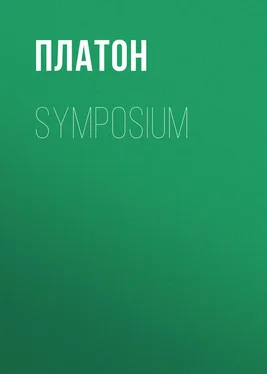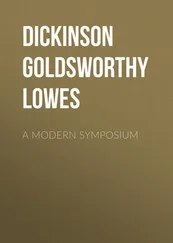Платон - Symposium
Здесь есть возможность читать онлайн «Платон - Symposium» — ознакомительный отрывок электронной книги совершенно бесплатно, а после прочтения отрывка купить полную версию. В некоторых случаях можно слушать аудио, скачать через торрент в формате fb2 и присутствует краткое содержание. Жанр: Философия, foreign_antique, foreign_prose, на английском языке. Описание произведения, (предисловие) а так же отзывы посетителей доступны на портале библиотеки ЛибКат.
- Название:Symposium
- Автор:
- Жанр:
- Год:неизвестен
- ISBN:нет данных
- Рейтинг книги:5 / 5. Голосов: 1
-
Избранное:Добавить в избранное
- Отзывы:
-
Ваша оценка:
- 100
- 1
- 2
- 3
- 4
- 5
Symposium: краткое содержание, описание и аннотация
Предлагаем к чтению аннотацию, описание, краткое содержание или предисловие (зависит от того, что написал сам автор книги «Symposium»). Если вы не нашли необходимую информацию о книге — напишите в комментариях, мы постараемся отыскать её.
Symposium — читать онлайн ознакомительный отрывок
Ниже представлен текст книги, разбитый по страницам. Система сохранения места последней прочитанной страницы, позволяет с удобством читать онлайн бесплатно книгу «Symposium», без необходимости каждый раз заново искать на чём Вы остановились. Поставьте закладку, и сможете в любой момент перейти на страницу, на которой закончили чтение.
Интервал:
Закладка:
But why again does this extend not only to men but also to animals? Because they too have an instinct of immortality. Even in the same individual there is a perpetual succession as well of the parts of the material body as of the thoughts and desires of the mind; nay, even knowledge comes and goes. There is no sameness of existence, but the new mortality is always taking the place of the old. This is the reason why parents love their children – for the sake of immortality; and this is why men love the immortality of fame. For the creative soul creates not children, but conceptions of wisdom and virtue, such as poets and other creators have invented. And the noblest creations of all are those of legislators, in honour of whom temples have been raised. Who would not sooner have these children of the mind than the ordinary human ones? (Compare Bacon's Essays, 8: – 'Certainly the best works and of greatest merit for the public have proceeded from the unmarried or childless men; which both in affection and means have married and endowed the public.')
I will now initiate you, she said, into the greater mysteries; for he who would proceed in due course should love first one fair form, and then many, and learn the connexion of them; and from beautiful bodies he should proceed to beautiful minds, and the beauty of laws and institutions, until he perceives that all beauty is of one kindred; and from institutions he should go on to the sciences, until at last the vision is revealed to him of a single science of universal beauty, and then he will behold the everlasting nature which is the cause of all, and will be near the end. In the contemplation of that supreme being of love he will be purified of earthly leaven, and will behold beauty, not with the bodily eye, but with the eye of the mind, and will bring forth true creations of virtue and wisdom, and be the friend of God and heir of immortality.
Such, Phaedrus, is the tale which I heard from the stranger of Mantinea, and which you may call the encomium of love, or what you please.
The company applaud the speech of Socrates, and Aristophanes is about to say something, when suddenly a band of revellers breaks into the court, and the voice of Alcibiades is heard asking for Agathon. He is led in drunk, and welcomed by Agathon, whom he has come to crown with a garland. He is placed on a couch at his side, but suddenly, on recognizing Socrates, he starts up, and a sort of conflict is carried on between them, which Agathon is requested to appease. Alcibiades then insists that they shall drink, and has a large wine-cooler filled, which he first empties himself, and then fills again and passes on to Socrates. He is informed of the nature of the entertainment; and is ready to join, if only in the character of a drunken and disappointed lover he may be allowed to sing the praises of Socrates: —
He begins by comparing Socrates first to the busts of Silenus, which have images of the gods inside them; and, secondly, to Marsyas the flute-player. For Socrates produces the same effect with the voice which Marsyas did with the flute. He is the great speaker and enchanter who ravishes the souls of men; the convincer of hearts too, as he has convinced Alcibiades, and made him ashamed of his mean and miserable life. Socrates at one time seemed about to fall in love with him; and he thought that he would thereby gain a wonderful opportunity of receiving lessons of wisdom. He narrates the failure of his design. He has suffered agonies from him, and is at his wit's end. He then proceeds to mention some other particulars of the life of Socrates; how they were at Potidaea together, where Socrates showed his superior powers of enduring cold and fatigue; how on one occasion he had stood for an entire day and night absorbed in reflection amid the wonder of the spectators; how on another occasion he had saved Alcibiades' life; how at the battle of Delium, after the defeat, he might be seen stalking about like a pelican, rolling his eyes as Aristophanes had described him in the Clouds. He is the most wonderful of human beings, and absolutely unlike anyone but a satyr. Like the satyr in his language too; for he uses the commonest words as the outward mask of the divinest truths.
When Alcibiades has done speaking, a dispute begins between him and Agathon and Socrates. Socrates piques Alcibiades by a pretended affection for Agathon. Presently a band of revellers appears, who introduce disorder into the feast; the sober part of the company, Eryximachus, Phaedrus, and others, withdraw; and Aristodemus, the follower of Socrates, sleeps during the whole of a long winter's night. When he wakes at cockcrow the revellers are nearly all asleep. Only Socrates, Aristophanes, and Agathon hold out; they are drinking from a large goblet, which they pass round, and Socrates is explaining to the two others, who are half-asleep, that the genius of tragedy is the same as that of comedy, and that the writer of tragedy ought to be a writer of comedy also. And first Aristophanes drops, and then, as the day is dawning, Agathon. Socrates, having laid them to rest, takes a bath and goes to his daily avocations until the evening. Aristodemus follows.
…
If it be true that there are more things in the Symposium of Plato than any commentator has dreamed of, it is also true that many things have been imagined which are not really to be found there. Some writings hardly admit of a more distinct interpretation than a musical composition; and every reader may form his own accompaniment of thought or feeling to the strain which he hears. The Symposium of Plato is a work of this character, and can with difficulty be rendered in any words but the writer's own. There are so many half-lights and cross-lights, so much of the colour of mythology, and of the manner of sophistry adhering – rhetoric and poetry, the playful and the serious, are so subtly intermingled in it, and vestiges of old philosophy so curiously blend with germs of future knowledge, that agreement among interpreters is not to be expected. The expression 'poema magis putandum quam comicorum poetarum,' which has been applied to all the writings of Plato, is especially applicable to the Symposium.
The power of love is represented in the Symposium as running through all nature and all being: at one end descending to animals and plants, and attaining to the highest vision of truth at the other. In an age when man was seeking for an expression of the world around him, the conception of love greatly affected him. One of the first distinctions of language and of mythology was that of gender; and at a later period the ancient physicist, anticipating modern science, saw, or thought that he saw, a sex in plants; there were elective affinities among the elements, marriages of earth and heaven. (Aesch. Frag. Dan.) Love became a mythic personage whom philosophy, borrowing from poetry, converted into an efficient cause of creation. The traces of the existence of love, as of number and figure, were everywhere discerned; and in the Pythagorean list of opposites male and female were ranged side by side with odd and even, finite and infinite.
But Plato seems also to be aware that there is a mystery of love in man as well as in nature, extending beyond the mere immediate relation of the sexes. He is conscious that the highest and noblest things in the world are not easily severed from the sensual desires, or may even be regarded as a spiritualized form of them. We may observe that Socrates himself is not represented as originally unimpassioned, but as one who has overcome his passions; the secret of his power over others partly lies in his passionate but self-controlled nature. In the Phaedrus and Symposium love is not merely the feeling usually so called, but the mystical contemplation of the beautiful and the good. The same passion which may wallow in the mire is capable of rising to the loftiest heights – of penetrating the inmost secret of philosophy. The highest love is the love not of a person, but of the highest and purest abstraction. This abstraction is the far-off heaven on which the eye of the mind is fixed in fond amazement. The unity of truth, the consistency of the warring elements of the world, the enthusiasm for knowledge when first beaming upon mankind, the relativity of ideas to the human mind, and of the human mind to ideas, the faith in the invisible, the adoration of the eternal nature, are all included, consciously or unconsciously, in Plato's doctrine of love.
Читать дальшеИнтервал:
Закладка:
Похожие книги на «Symposium»
Представляем Вашему вниманию похожие книги на «Symposium» списком для выбора. Мы отобрали схожую по названию и смыслу литературу в надежде предоставить читателям больше вариантов отыскать новые, интересные, ещё непрочитанные произведения.
Обсуждение, отзывы о книге «Symposium» и просто собственные мнения читателей. Оставьте ваши комментарии, напишите, что Вы думаете о произведении, его смысле или главных героях. Укажите что конкретно понравилось, а что нет, и почему Вы так считаете.











